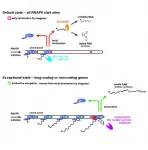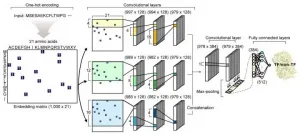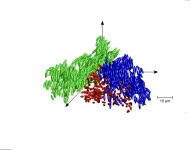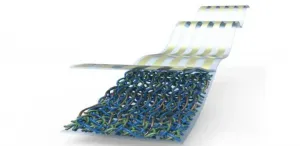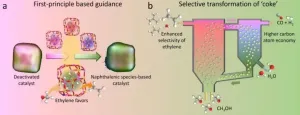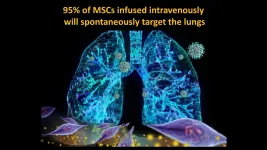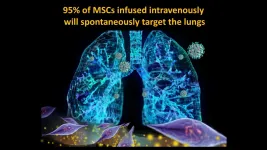Catalyst transforms plastic waste to valuable ingredients at low temperature
2021-01-05
(Press-News.org) For the first time, researchers have used a novel catalyst process to recycle a type of plastic found in everything from grocery bags and food packaging to toys and electronics into liquid fuels and wax.
The team published their results on Dec. 10 in Applied Catalysis B: Environmental.
"Plastics are essential materials for our life because they bring safety and hygiene to our society," said paper co-authors Masazumi Tamura, associate professor in the Research Center for Artificial Photosynthesis in the Advanced Research Institute for Natural Science and Technology in Osaka City University, and Keiichi Tomishige, professor in the Graduate School of Engineering in Tohoku University. "However, the growth of the global plastic production and the rapid penetration of plastics into our society brought mismanagement of waste plastics, causing serious environmental and biological issues such as ocean pollution."
Polyolefinic plastics -- the most common plastic -- have physical properties that make it difficult for a catalyst, responsible for inducing chemical transformation, to interact directly with the molecular elements to cause a change. Current recycling efforts require temperatures of at least 573 degrees Kelvin, and up to 1,173 degrees Kelvin. For comparison, water boils at 373.15 degrees Kelvin, and the surface of the Sun is 5,778 degrees Kelvin.
The researchers looked to heterogenous catalysts in an effort to find a reaction that might require a lower temperature to activate. By using a catalyst in a different state of matter than the plastics, they hypothesized that the reaction would be stronger at a lower temperature.
They combined ruthenium, a metal in the platinum family, with cerium dioxide, used to polish glass among other applications, to produce a catalyst that caused the plastics to react at 473 degrees Kelvin. While still high for human sensibilities, it requires significantly less energy input compared to other catalyst systems.
According to Tamura and Tomishige, ruthenium-based catalysts have never been reported in the scientific literature as a way to directly recycle polyolefinic plastics.
"Our approach acted as an effective and reusable heterogeneous catalyst, showing much higher activity than other metal-supported catalysts, working even under mild reaction conditions," Tamura and Tomishige said. "Furthermore, a plastic bag and waste plastics could be transformed to valuable chemicals in high yields."
The researchers processed a plastic bag and waste plastics with the catalyst, producing a 92% yield of useful materials, including a 77% yield of liquid fuel and a 15% yield of wax.
"This catalyst system is expected to contribute to not only suppression of plastic wastes but also to utilization of plastic wastes as raw materials for production of chemicals," Tamura and Tomishige said.
INFORMATION:
Other contributors include Yosuke Nakaji, Shuhei Miyaoka and Yoshinao Nakagawa, all affiliated with the Graduate School of Engineering at Tohoku University; and Shogo Kumagai, Mifumi Tanji and Toshiaki Yoshioka, all affiliated with the Graduate School of Environmental Studies at Tohoku University.
This work was supported by the Environment Research and Technology Development Fund of the Environmental Restoration and Conservation Agency of Japan.
[Attachments] See images for this press release:
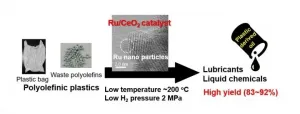
ELSE PRESS RELEASES FROM THIS DATE:
2021-01-05
An imbalance of the body's oxygen producing free radicals and its antioxidant cells could be the reason why gum disease and chronic kidney disease affect each other, a new study led by the University of Birmingham has found.
Periodontitis - or gum disease - is a common, inflammatory disease which causes bleeding gums, wobbly or drifting teeth and can eventually result in tooth loss.
Previous studies have shown a link between the severe oral inflammation caused by gum disease and chronic kidney disease (CKD) which demonstrated that those with worse inflammation of the gums have worse kidney function.
Previous research also showed that patients with CKD and periodontitis experience ...
2021-01-05
Practicing gratitude and looking to the future will help safeguard our mental wellbeing during Covid-19 lockdowns, a new study in the Journal of Positive Psychology reports.
In the first study of its kind, researchers from the University of Surrey investigated the effectiveness of three psychological interventions -- nostalgia, a sentimentality for the past; gratitude, recognising the good things currently in our life; and best possible self, thinking about positive elements of the future -- and how they each affect wellbeing during lockdowns.
Personal characteristics such as emotion regulation (the ability to respond ...
2021-01-05
In a joint collaboration, Danish and German researchers have characterized a cellular activity that protects our cells from potentially toxic by-products of gene expression. This activity is central for the ability of multicellular organisms to uphold a robust evolutionary 'reservoir' of gene products.
Manufacturing processes need quality control systems in order to ensure proper assembly of functional products. Moreover, space-consuming, and perhaps even toxic, by-products of such processes need to be properly discarded or recycled by efficient waste handling systems.
By analogy, transcription of our genome is an imperfect process that produces large quantities of non-functional and potentially harmful transcripts both from within and ...
2021-01-05
Researchers at the Francis Crick Institute and the University of Western Australia have developed a new imaging method to see where antibiotics have reached bacteria within tissues. The method could be used to help develop more effective antibiotic treatments, reducing the risk of antibiotic resistance.
During bacterial infections like tuberculosis, bacteria enter human cells, which poses a challenge for treatment, as antibiotics must reach and enter all infected cells in order to be effective. If researchers could select for or develop more effective antibiotics based on where they reach, this may reduce the length of treatment ...
2021-01-05
A joint research team from KAIST and UCSD has developed a deep neural network named DeepTFactor that predicts transcription factors from protein sequences. DeepTFactor will serve as a useful tool for understanding the regulatory systems of organisms, accelerating the use of deep learning for solving biological problems.
A transcription factor is a protein that specifically binds to DNA sequences to control the transcription initiation. Analyzing transcriptional regulation enables the understanding of how organisms control gene expression in response to genetic or environmental changes. In this regard, finding the transcription factor of an organism is the first step in the analysis ...
2021-01-05
While glass is a truly ubiquitous material that we use on a daily basis, it also represents a major scientific conundrum. Contrary to what one might expect, the true nature of glass remains something of a mystery, with scientific inquiry into its chemical and physical properties still underway. In chemistry and physics, the term glass itself is a mutable concept: It includes the substance we know as window glass, but it may also refer to a range of other materials with properties that can be explained by reference to glass-like behaviour, including, for instance, ...
2021-01-05
Sunlight offers a potential solution in the search for an energy source that does not harm the planet, but this depends on finding a way to efficiently turn electromagnetic energy into electricity. Researchers from KAUST have shown how a known herbicide can improve this conversion in organic devices.
While solar cells have traditionally been made from inorganic materials such as silicon, organic materials are starting to break through as an alternative because they are light, flexible and relatively inexpensive to make, even offering the possibility for ...
2021-01-05
MTO process, which was first commercialized in 2010, is a catalytic process converting methanol, which is typically made from coal, natural gas, biomass, and CO2, over SAPO-34 zeolite catalyst. It's becoming one of the main streams for producing light olefins, including ethylene and propylene, from non-oil resources.
One of the major challenges in MTO is the rapid deactivation of zeolite catalyst due to the coke deposition.
In industrial practices, a fluidized bed reactor-regenerator configuration is normally used in order to maintain the continuous operation, in ...
2021-01-05
Dr. Camilo Ricordi, director of the Diabetes Research Institute (DRI) and Cell Transplant Center at the University of Miami Miller School of Medicine, and his team of international collaborators are reporting the results of a groundbreaking randomized controlled trial showing umbilical cord-derived mesenchymal stem cell (UC-MSC) infusions safely reduce risk of death and quicken time to recovery for the most severe COVID-19 patients. Dr. Ricordi's peer-reviewed paper has just been published in STEM CELLS Translational Medicine (SCTM) January 2021.
The clinical trial, authorized by the FDA last ...
2021-01-05
Dr. Camilo Ricordi, director of the Diabetes Research Institute (DRI) and Cell Transplant Center at the University of Miami Miller School of Medicine, and his team of international collaborators are reporting the results of a groundbreaking randomized controlled trial showing umbilical cord-derived mesenchymal stem cell (UC-MSC) infusions safely reduce risk of death and quicken time to recovery for the most severe COVID-19 patients. Dr. Ricordi's peer-reviewed paper has just been published in STEM CELLS Translational Medicine (SCTM) January 2021.
The clinical trial, authorized by the FDA last April, was initiated by The Cure Alliance, a 501(c)(3) non-profit organization of research scientists founded ten years ago by Dr. Ricordi for scientists ...
LAST 30 PRESS RELEASES:
[Press-News.org] Catalyst transforms plastic waste to valuable ingredients at low temperature


